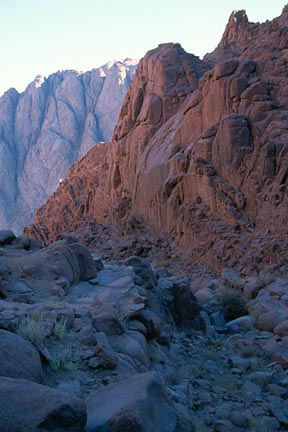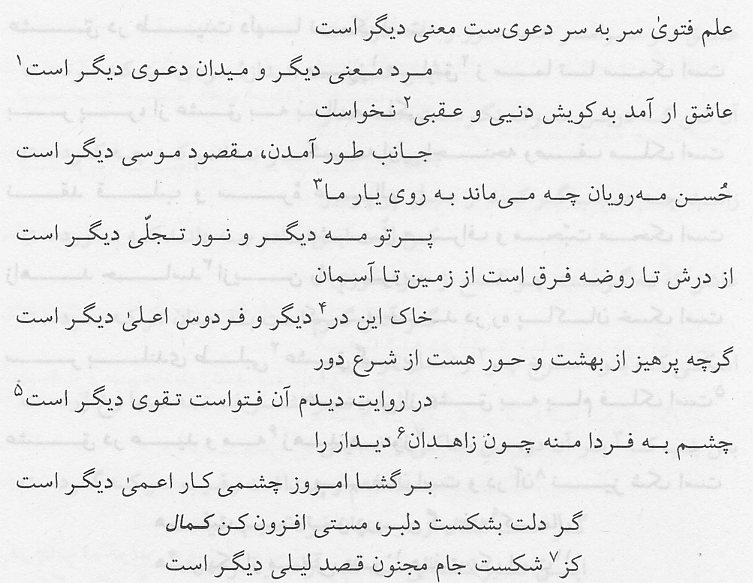
Something Else!
Quarrelsome science of Fatwaa one
thing, the meanings [1]
Something Else!
The man of substance one thing, arena
of fights
Something Else!
The lover if arrives at Its Hearth,
religion and judgment unwanted [2]
Reaching the “side of the mountain”,
the intent of Moses was
Something Else!
From Its door to the Gardens,
difference between the earth and heavens
The dust at this door one thing,
lofty Paradise
Something Else!
Turning away from the Paradise and
Hoor, incongruent to Shariah [3]
In written books, I saw this as
Fatwaa, but true righteousness
Something Else!
Pin not your eyes upon tomorrow like
others
Open your eyes today, the way of the
blind [4]
Something Else!
Kamaal:
If your heart is broken, indulge upon
drunkenness [5]
Breaking the goblet of Majnoon, the
intent of Leyli
Something Else!
[1] Fatwaa is an Islamic
religious “due process” for making decisions or finding solutions for
day-to-day affairs of the believers. However, this is abused amongst
the Muslims and has become the religion itself. Originally it was
intended to address new modern issues in the Muslim life but today it
is used for changing the teachings of the Prophet for personal power
and gain. Often the Moftis, people who issue Fatwaa, they quarrel and
argue on silly wording of their orders and Kamaal dismisses them in few
words reminding them of sincere men of substance i.e. true belief is
something else.
[2] Kamaal narrates that when
someone falls in love with the Creator, they do not so because of some
dry religious conviction they do so because of deep emotions and
passions in their hearts. Today we see on TV people running to places
of worship claiming they are the best and they are loved by Allah but
in reality they do not love Allah at all, they love the building and
the books and their preachers. In order to make the point clear Kamaal
uses an example from Koran, when Prophet Moses went to the side of the
Mount Sinai he did not do so for simple reasons of travel or
exploration, he did so to uncover an amazing conversation and eternal
loving relationship with his Maker. Kamaal uses the two Arabic Koranic
words ‘Janib’ (side or direction) and ‘Toor’ (Mount Sinai) very pretty
poetic expression. (Koran [19:25], [20:80], [28:29], [28:46])
[3] Shariah means the Law
the divine religious law especially in Islamic Arabic terms. Again
Kamaal emphasizes the importance of not being swayed away by paradigms
and metaphors like the Paradise or the virgin maiden dwellers within
e.g. Hoor.
[4] Open your heart’s eyes to see
that you need to shut your physical eyes to this deceptive world.
[5] When Allah wants your
attention, The Majesty breaks youe hearts. In that precise moment of
pain and agony we are facing in close proximity the beautiful Face of
the Creator. Kamaal encourages us to jump on the opportunity and drink
the wine of Its love and become intoxicated with Its passion. The
metaphor he uses is that Leyli did not break the goblet of the heart of
Majnoon so he would stop loving her but the reverse for Majnoon to love
her ever more madly. Leyli & Majnoon is an ancient Arabic tale of
two lovers similar to Romeo and Juliet, with Leyli being the female and
the male Majnoon, which in Arabic means maddened.
Background: Mount Sinai in Egypt.
© 2003-2002,
By Dara Shayda



